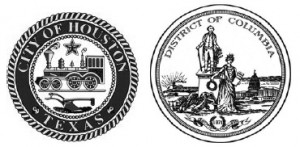The case In Re Houston, involved the City of Houston and the District of Columbia city seals. Both cities attempted to register their seals and both applications were rejected by an examining attorney at the trademark office. The rejection was based on Section 2(b) of the Lanham act, 15 U.S.C. § 1052 which forbid registration of any trademark which,
Consists of or comprises the flag or coat of arms or other insignia of the United States, or of any State or municipality, or of any foreign nation, or any simulation thereof.
At the Trademark Trial and Appeal Board, Houston argued that because it was a government entity seeking to register its own seal, Section 2(b) did not apply. The District of Columbia argued Section 2(b) was inconsistent with the Paris Convention of 1883. Both arguments were rejected and the cities appealed to the United States District Court for the Federal Circuit.
On appeal, Houston again argued that “government entities use their official insignia to identify their goods and services, and unauthorized use of these insignia confuses the public about the government entities’ approval of the goods or services.” Houston further argued that Section 2(b), “is at odds with the Lanham Act’s goal of protecting the public from ‘pirates and cheats.’ ” Both of these arguments were rejected. The court held,
The prohibition of § 2(b) is clear. Section 2(b) prohibits registration of an “insignia of the United States, or of any State or municipality.” We see nothing in this plain language that suggests a government entity such as Houston should be exempted from the reach of the prohibition.
. . .
We note that Houston has other means to prevent “pi-rates and cheats” from using its city seal to deceive the public. Presumably the city of Houston could pass an ordinance prohibiting such activity. Other legal protections under the Lanham Act may exist as well.
The District of Columbia tried a different argument. It argued that because the Lanham Act was primarily implementing the Paris Convention Treaty of 1883, the Act must be interpreted in light of the language of the treaty.
The District contends that the Board’s interpretation of § 2(b) violates this U.S. treaty obligation because it prohibits everyone, including a municipality in a foreign member country, from registering its insignia in the United States. According to the District, the Board’s interpretation of § 2(b) must be reversed as it violates the Charming Betsy principle by construing a domestic law to violate the law of nations.
The District argued that because the treaty required recognition of trademarks filed in foreign countries in the United States, if a foreign municipality registered its mark in its home country, the United States would need to accept the registration of that insignia or be in violation of the treaty.
The court of appeals disagreed, holding that there is nothing in the Paris Convention which requires that the United States allow the registration of an insignia of a United States municipality. Whether the treaty would be violated in a hypothetical case of a foreign municipality attempting to register its insignia in the United States was not before the court and the court of appeals refused to address that hypothetical situation.
Registration of municipal insignia was again rejected despite several creative arguments. This will likely continue to be the law going forward unless Congress amends the Lanham Act to allow such registrations. As the court points out however, the municipalities are currently well protected — even without a trademark registration the municipalities can pass laws preventing the use of their insignia as well as bring claims against infringers under other provisions of the Lanham Act.

